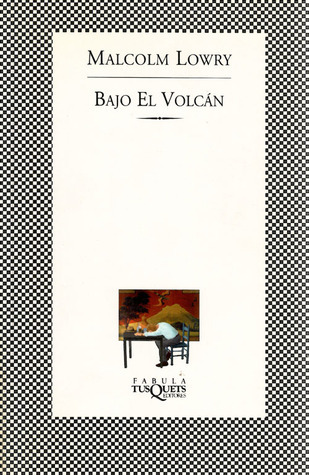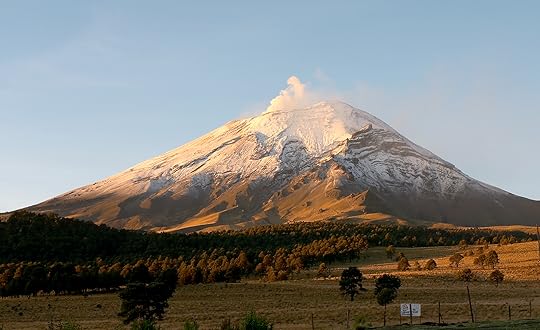What do you think?
Rate this book


424 pages, Mass Market Paperback
First published January 1, 1947


…Night: and once again, the nightly grapple with death, the room shaking with daemonic orchestras, the snatches of fearful sleep, the voices outside the window, my name being continually repeated with scorn by imaginary parties arriving, the dark’s spin-nets. As if there were not enough real noises in these nights the colour of grey hair. Not like the rending tumult of American cities, the noise of the unbandaging of great giants in agony. But the howling pariah dogs, the cocks that herald dawn all night, the drumming, the moaning that will be found later white plumage huddled on telegraph wires in back gardens or fowl roosting in apple trees, the eternal sorrow that never sleeps of great Mexico.
But if you look at that sunlight there, ah, then perhaps you’ll get the answer, see, look at the way it falls through the window: what beauty can compare to that of a cantina in the early morning? Your volcanoes outside? Your stars – Ras Algethi? Antares raging south south-east? Forgive me, no. Not so much the beauty of this one necessarily, which, a regression on my part, is not perhaps properly a cantina, but think of all the other terrible ones where people go mad that will soon be taking down their shutters, for not even the gates of heaven, opening wide to receive me, could fill me with such celestial complicated and hopeless joy as the iron screen that rolls up with a crash, as the unpadlocked jostling jalousies which admit those whose souls tremble with the drinks they carry unsteadily to their lips. All mystery, all hope, all disappointment, yes, all disaster, is here, beyond those swinging doors.
“¿Qué es el hombre sino un alma minúscula que anima un cadáver?”Siendo honesto debería haberle otorgado solo 3 estrellas, pero, aunque solo sea por las últimas 150 páginas, he decidido sumarle la cuarta. Y el caso es que estoy bastante de acuerdo con el editor que le aconsejó que metiera la tijera al manuscrito, algo que Lowry comenta en el prólogo que él mismo escribió expresamente para la primera edición francesa en un caso rarísimo en el que el autor cree necesario explicar su propio texto.
“—No voy a beber —dijo el Cónsul parándose en seco—. ¿O sí? De cualquier modo, no será mezcal. —Claro que no, la botella está allí detrás de aquel arbusto. Recógela. —No puedo —objetó. —Está bien; tómate tan sólo un trago, sólo lo indispensable, el trago terapéutico: tal vez dos tragos. —¡Dios! —dijo el Cónsul—. ¡Ah! Bien. Dios. Cristo. —Y luego, podrás decir que no hay que tomarlo en cuenta. —No, en efecto. No es mezcal. —Claro que no; es tequila. Podrías echarte otro. —Gracias, así lo haré —tembloroso, volvió a llevar la botella a sus labios. Qué dicha. Jesús. Santuario… Qué horror —, añadió…”Y la lava que llena las laderas de ambos volcanes, de los dos, uno por no poder conceder un perdón que podría facilitar una nueva oportunidad de felicidad junto a Yvonne y el otro por dejarse dominar sin remedio por la adicción, lleva el nombre de culpa, que, como dijo Durrell, “se apresura siempre hacia su complemento, el castigo, y sólo allí encuentra su satisfacción”. Y vaya si Geoffrey puso todo su empeño en encontrarlo.


... the Consul nodded desperately, removing his glasses, and at this point, the Consul remembered, he had been without a drink nearly ten minutes; the effect of the tequila too had almost gone. He had peered out at the garden, and it was as though bits of his eyelids had broken off and were flittering and jittering before him, turning into nervous shapes and shadows, jumping to the guilty chattering in his mind, not quite voices yet, but they were coming back, they were coming back.




…set the writhing mass in an ashtray, where beautifully conforming it folded upon itself, a burning castle, collapsed, subsided to a ticking hive through which sparks like tiny red worms crawled and flew, while above a few grey wisps of ashes floated in the thin smoke, a dead husk now, faintly crepitant…
Suddenly from outside, a bell spoke out, then ceased abruptly...
Over the town, in the dark tempestuous night, backwards revolved the luminous wheel
Popocatepetl towered through the window, its immense flanks partly hidden by rolling thunderheads; its peak blocking the sky, it appeared almost right overhead, the barranca, the Farolito, directly beneath it. Under the volcano! It was not for nothing the ancients had placed Tartarus under Mt. Aetna, nor within it, the monster Typhoeus, with his hundred heads and—relatively—fearful eyes and voices.
As if, as if, as if, he were not sober now! Yet there was some elusive subtlety in the impeachment that still escaped him. For he was not sober. No, he was not, not at this very moment he wasn’t! But what had that to do with a minute before, or half an hour ago? And what right had Yvonne to assume it, assume either that he was not sober now, or that, far worse, in a day or two he would be sober?
…
“Good God, if our civilisation were to sober up for a couple of days it’d die of remorse on the third—”


Lowry could not perform the vital surgery of separating himself from his characters. He suspected at times that he was not a writer so much as being written, and with panic he realized that self-identity was as elusive as ever.You could state this novel was amazing. You could name it false. You could call this novel a giant of Modernism. You could pass it off as the rambling obscurities of a overeducated white guy with too much money in pocket and too lengthy a time on his hands, enough of each to not only allow for lazy alcoholism but to also think it worthy of a book. You could wonder at the explications of historical context or frown at it for being too 'political', depending on whether your methodologies for coping with reality lie in grasping explication or willful ignorance.
-Conrad Knickerbocker
Meantime do you see me as still working on the book, still trying to answer such questions as: Is there any ultimate reality, external, conscious and ever-present etc. etc. that can be realised by any such means that may be acceptable to all creeds and religions and suitable to all climes and countries? Or do you find me between Mercy and Understanding, between Chesed and Binah (but still at Chesed)—my equilibrium, and equilibrium is all, precarious—balancing, teetering over the awful unbridgeable void...Though it is perhaps a good idea under the circumstances to pretend at least to be proceeding with one's great work on "Secret Knowledge," then one can always say when it never comes out that the title explains this deficiency.There's something bloodcurdling about the inexorable crimes of history and the question posed in every era of how one is to 'do one's part'. For what constitutes a 'crime', and what is a suitable 'part', and just how long is one supposed to wait around for a situation to arise where it is not only 'right' to act, but 'proper' in motivation and 'vital' in context and anything but 'trivial'?